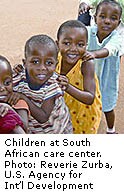
WEDNESDAY, Nov. 28 (HealthDay News) — Treatment with a combination of certain HIV drugs greatly reduces the risk of recurrent malaria in children with HIV who are also being treated with drugs to prevent the mosquito-borne infection, according to new research.
The study included more than 170 HIV-positive infants and children up to 6 years old in Uganda who were receiving anti-malarial drugs and HIV treatment, including either a combination of the protease inhibitors lopinavir and ritonavir, or a class of drugs called non-nucleoside reverse transcriptase inhibitors (NNRTIs).
Despite the anti-malarial drugs and other preventive measures — such as mosquito nets — the children’s risk of developing malaria during their first six months of HIV treatment was more than 40 percent. The risk during that time period was about the same whether the children were taking the protease inhibitors or an NNRTI, the investigators found.
However, among children who developed malaria and were successfully treated for it, 41 percent of those taking an NNRTI had a recurrence of malaria within 28 days compared with 14 percent of those taking the protease inhibitors.
And after 63 days, malaria recurrence had occurred among 54 percent of those taking an NNRTI and 28 percent of those taking the protease inhibitors, the research showed.
Blood levels of anti-malarial drugs in children taking the protease inhibitors were higher than in those taking an NNRTI, the researchers said.
The study, published Nov. 29 in the New England Journal of Medicine, was funded by the U.S. National Institute of Child Health and Human Development.
“It’s possible that these protease inhibitors prevent anti-malarial drugs from breaking down or have some other additive effect against the malarial parasite,” Dr. Lynne Mofenson, chief of the Pediatric, Adolescent, and Maternal AIDS Branch at the NICHD, said in an institute news release.
“Laboratory studies also suggest that protease inhibitors can block the malaria parasite outright. Finding out why this drug combination is effective is an area for further study,” she added.
More information
The U.S. National Institute of Allergy and Infectious Diseases has more about malaria.

